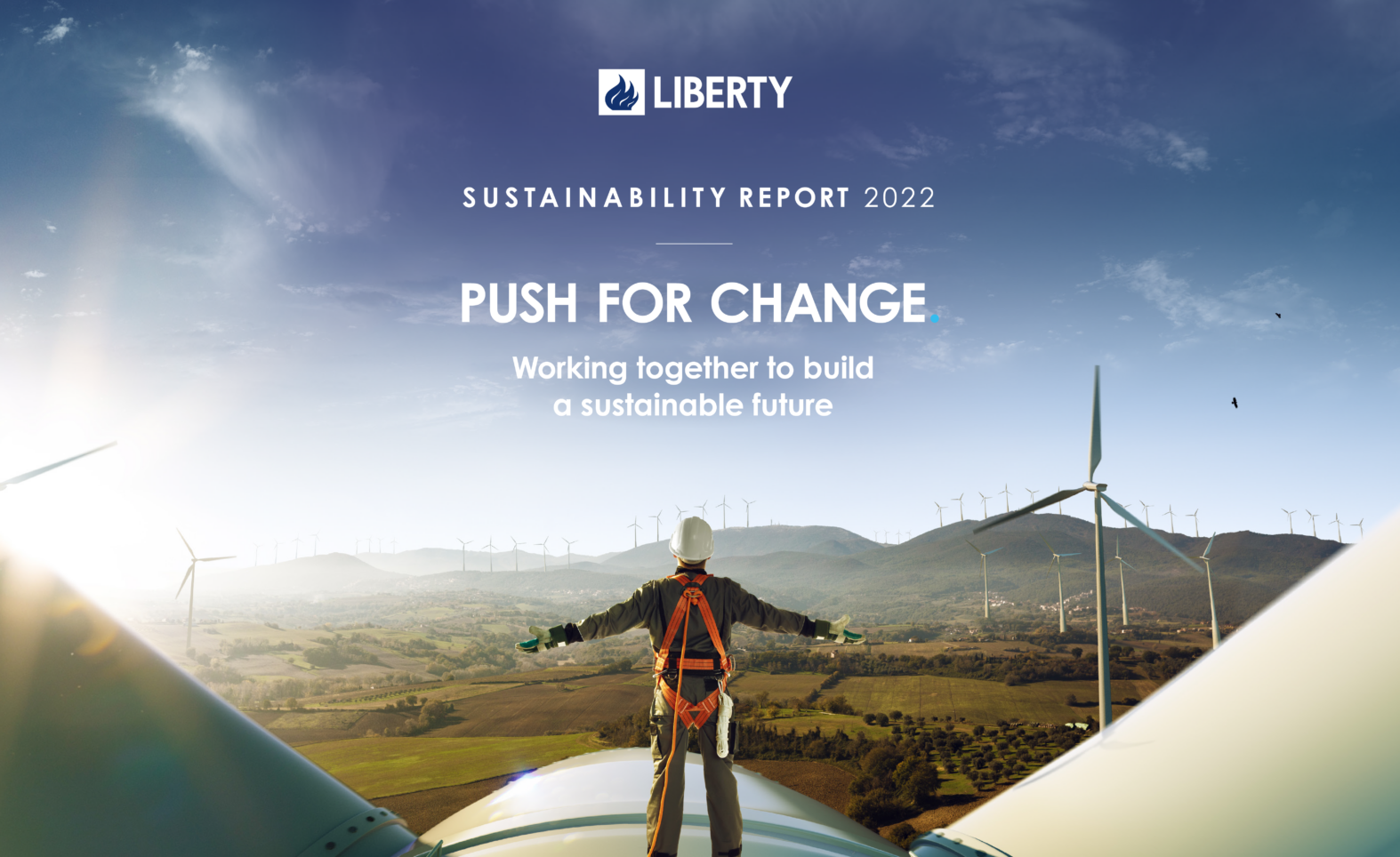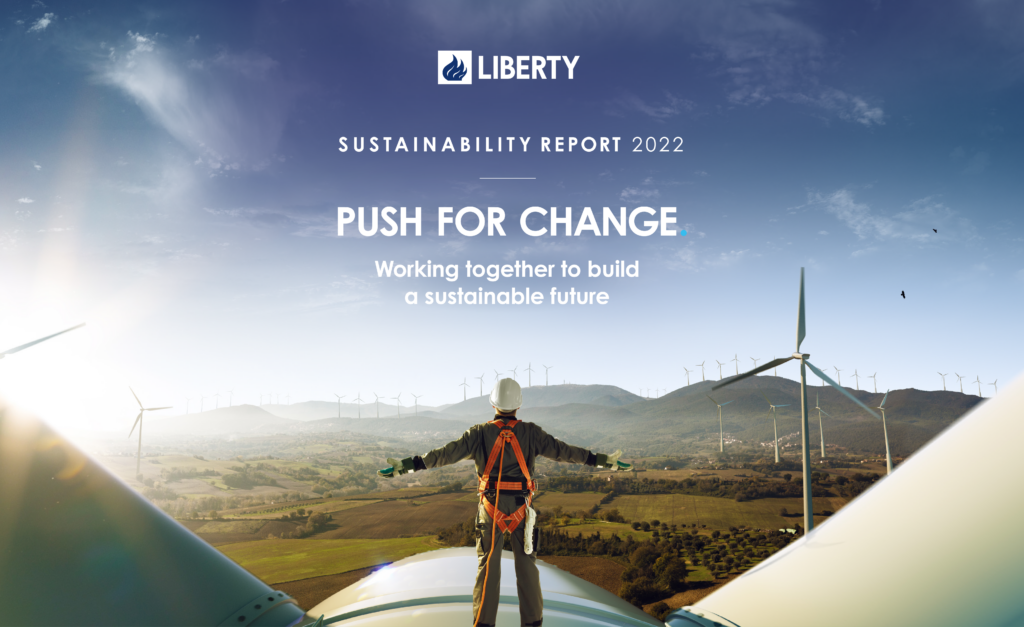SPOKEN – Episode 1
Welcome to our brand new podcast! This first edition has important ...

This episode of SPOKEN highlights the 2022 Sustainability Report and we hear from Marian D’Auria, Denise Timns, Theuns Victor and other colleagues featured in the report, who tell us about the important role that ESG plays on our journey towards CN30.

| TIMECODE | NAME | Dialogue |
| 00:00:00 | JINGLE | Spoken by GFG Alliance. |
| 00:00:04 | CHLOE TILLEY | Hello and welcome to Spoken, the podcast for GFG Alliance colleagues across the world. I’m Chloe Tilley and this time our theme is building a sustainable future. We’ll be hearing from colleagues about LIBERTY’s, new sustainability report, which is a milestone for the business, and finding out how you can make a difference. |
| 00:00:23 | CHLOE TILLEY | First, we’re joined by Marian D’Auria, who is GFG’s Global Head of Risk and Sustainability. Marian to start, how does this report sit within the business’s sustainability ambitions? |
| 00:00:34 | MARIAN D’AURIA | So this is the first time that we have outlined all of our ESG ambitions and also set out a clear road map as to how we’re going to achieve those. And that looks at our environmental impact and how we manage that in the future. It looks at how we bring our communities with us and the importance of engaging our workforce around these efforts. But also inspiring the next generation of people to come and work within the steel industry. |
| 00:01:03 | And it looks at how we embed ESG considerations in our decision making and governance frameworks. So for me, really exciting to be able to set that all out in one place so that our stakeholders can see really clearly what it is that we’re trying to achieve in terms of managing our impact on people and the planet. | |
| 00:01:20 | CHLOE TILLEY | Well, let’s head now to Australia, LIBERTY is working to strengthen relationships with indigenous people, including the creation of a reconciliation action plan or RAP and cultural awareness workshops. Chris Smyth is Group Manager, Environment, Regulatory and Stakeholder. Chris, please do explain to us what the team have been doing there. |
| 00:01:39 | CHRIS SMYTH | During the development of the RAP, the RAP team and the local teams across the country have held three workshops already with employees and indigenous stakeholders. We’ve also got an artwork under development by Gavin Wanganeen, who’s not only a famous Australian rules footballer, but he’s also an artist and activist and an entrepreneur. So we’re really looking forward to that. |
| 00:02:00 | But also recently, and this is a wonderful program we signed up for an initial two-year period of support for the Shooting Stars programme. Now this is a really excellent scheme, and it empowers young first nations girls and women to improve the educational outcomes in high school and beyond. | |
| 00:02:18 | So if you think about our core value of family, these are all examples of why it’s so important for us to support all of our local communities around the world. | |
| 00:02:26 | Chloe Tilley | Well, let’s head now to LIBERTY Ostrava in the Czech Republic to find out about their gender diversity programs that encourage women into the industry. At the plant is Iveta Danysova an HR Specialist in the Training and Development department? Iveta, tell us more. |
| 00:02:41 | IVETA DANYSOVA | Well, we spoke to our women, made some workshops with them, gave them some soft skills trainings. It’s a common part of our daily life that we have more diverse teams. And I think that people in general, not only women, understand that we have for the same starting point and it’s nice to have younger generation here. And this is something nice and new which brings a new energy to the company’s life. |
| 00:03:15 | Chloe Tilley | Now we’re joined by Theuns Victor, Interim CEO, Primary Steel and Mining, Director Industrial Projects and the ESG Environmental lead. Theuns, steel manufacturing is carbon intensive. So what are LIBERTY’s plans to reduce the reliance on carbon as the main source of fuel? |
| 00:03:32 | THEUNS VICTOR | Our iron ore-based processes like the blast furnace facilities are mainly chemically driven through chemical energy and obviously that is based on carbon. These processes we will change away from carbon as the main fuel to hydrogen. |
| 00:03:50 | The other side is that we also have electric arc furnaces which mainly use electrical energy as the main fuel. Currently those electrical energy is generated through mainly in most of the cases, coal-fired power stations and those processes we will transition to renewable energy, stuff like solar, wind, hydropower stations, pumped hydro and different kinds of storage facilities. | |
| 00:04:14 | Chloe Tilley | Okay. Well, joining us now is Roland Hinterreiter who is Hybrid Furnace Project Director in Ostrava. Roland, welcome. What is LIBERTY doing in Ostrava to progress its GREENSTEEL ambitions? |
| 00:04:26 | ROLAND HINTERREITER | So one of the first project or milestone is the implementation of the hybrid furnace. So this project was started in last July and our target is to start operation in first quarter of 2025. |
| 00:04:45 | CHLOE TILLEY | How do your colleagues in Ostrava feel about these achievements? |
| 00:04:48 | ROLAND HINTERREITER | They feel proud to be participating and on the team. So it is showing that also in the whole region, this project is getting, let’s say, a very high reputation. |
| 00:05:01 | CHLOE TILLEY | Next, Denise Timns is GFG’s Chief Human Resources Officer and the ESG Social lead. Denise, what are you doing to embed a safe and inclusive culture where colleagues can contribute but also make a difference. |
| 00:05:14 | DENISE TIMNS | So our people plan is an holistic approach across the group. So firstly sustainability. We live by our purpose of sustainability. We need to attract talent for now and in the future. Developing our current workforce and our future workforce, very important. Ask and listen to our employees regularly via surveys. We care about and support our employees from the physical safety standpoint but also from being mentally well. |
| 00:05:42 | DENISE TIMNS | We work very closely with our unions and communities and maintain a positive social dialogue to ensure that relationships stay strong. When the worst happens, and our people need to support to find a future role then we provide as much support as possible via outplacement networks, internal roles etc. |
| 00:06:02 | And finally, the GFG Foundation is a registered charity, and we are investing in future generations working in schools attracting pupils through STEM and engaging with local organisations and even sports teams to inspire young people. | |
| 00:06:19 | CHLOE TILLEY | Well, Marian D’Auria, GFG’s Global Head of Risk and Sustainability is still with us. Marian, we started by talking about LIBERTYs new sustainability report. What would you say to someone listening now to encourage them to read the report? |
| 00:06:33 | MARIAN D’AURIA | I’d say there’s something for everyone in the report really. And it’s not something that has to be read from cover to cover, so don’t feel intimidated that you’re going to be in a really long technical read. It’s loads of pictures. It’s written in a way that has explanatory diagrams. It’s a really helpful way for people to understand what it is that we are trying to achieve as a business, as an industry and how we can continue to make steel, which is absolutely crucial for the world’s economies and communities in a sustainable way. |
| 00:07:05 | Chloe Tilley | So if you would like to read the new Sustainability report, just go to libertysteelgroup.com/sustainability-report. |
| 00:07:15 | And that’s it for this edition of Spoken. Thank you to all of our guests. Do join us again soon when we’ll keep you updated with the latest GFG news and hear from more colleagues across the business. | |
| 00:07:25 | Until then, from me, Chloe Tilley, thank you for listening and goodbye. | |
| 00:07:28 | jingle | Spoken, back soon. |
| 00:07:34 | End of tape. |
Leave A Reply